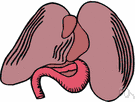gall
Also found in: Thesaurus, Medical, Acronyms, Idioms, Encyclopedia, Wikipedia.
gall 1
(gôl)n.
1. Outrageous insolence; effrontery: After borrowing my car, he had the gall to complain about its seats.
2.
a. Bitterness of feeling; rancor.
b. Something bitter to endure: the gall of defeat.
3. See bile.
[Middle English galle, gallbladder, bile, courage, from Old English gealla, galla, bile; see ghel- in Indo-European roots.]
gall 2
(gôl)n.
1. A skin sore caused by friction and abrasion: a saddle gall.
2.
a. Exasperation; vexation.
b. The cause of such vexation.
v. galled, gall·ing, galls
v.tr.
1. To irk or exasperate; vex: It galled me to have to wait outside.
2. To wear away or make sore by abrasion; chafe:
v.intr.
To become worn or sore by abrasion.
[Middle English galle, from Old English gealla, possibly from Latin galla, nutgall.]
gall 3
(gôl)n.
An abnormal growth of plant tissue caused by an organism, such as an insect, mite, or bacterium, or by a wound.
[Middle English galle, from Old French, from Latin galla, nutgall.]
American Heritage® Dictionary of the English Language, Fifth Edition. Copyright © 2016 by Houghton Mifflin Harcourt Publishing Company. Published by Houghton Mifflin Harcourt Publishing Company. All rights reserved.
gall
(ɡɔːl)n
1. informal impudence
2. bitterness; rancour
3. something bitter or disagreeable
4. (Physiology) physiol an obsolete term for bile1
5. (Anatomy) an obsolete term for gallbladder
[from Old Norse, replacing Old English gealla; related to Old High German galla, Greek kholē]
gall
(ɡɔːl)n
1. (Pathology) a sore on the skin caused by chafing
2. something that causes vexation or annoyance: a gall to the spirits.
3. irritation; exasperation
vb
4. (Pathology) pathol to abrade (the skin, etc) as by rubbing
5. (tr) to irritate or annoy; vex
[C14: of Germanic origin; related to Old English gealla sore on a horse, and perhaps to gall1]
gall
(ɡɔːl)n
(Plant Pathology) an abnormal outgrowth in plant tissue caused by certain parasitic insects, fungi, bacteria, or mechanical injury
[C14: from Old French galle, from Latin galla]
Collins English Dictionary – Complete and Unabridged, 12th Edition 2014 © HarperCollins Publishers 1991, 1994, 1998, 2000, 2003, 2006, 2007, 2009, 2011, 2014
gall1
(gɔl)n.
1. audacity; impudence; effrontery.
3. something bitter or severe.
4. bitterness of spirit; rancor.
[before 900; Old English galla, gealla, c. Old High German galla; akin to Latin fel, Greek cholḗ gall, bile]
gall2
(gɔl)v.t.
1. to make sore by rubbing; chafe severely: The saddle galled the horse's back.
2. to irritate greatly: An arrogant manner galls me.
v.i. 3. to be or become chafed.
n. 4. a sore on the skin, esp. of a horse, due to rubbing.
5. something very vexing or irritating.
6. a state of vexation or irritation.
[before 1000; Middle English galle, perhaps < Middle Dutch, Middle Low German gall, akin to Old English gealla sore on a horse]
gall3
(gɔl)n.
any abnormal outgrowth or swelling in a plant, as from viral damage, insect egg deposits, or chemical irritants.
[1350–1400; Middle English galle < Middle French < Latin galla gallnut. See gall2]
Random House Kernerman Webster's College Dictionary, © 2010 K Dictionaries Ltd. Copyright 2005, 1997, 1991 by Random House, Inc. All rights reserved.
gall
(gôl) An abnormal swelling of plant tissue, caused by insects, microorganisms, or injury.
The American Heritage® Student Science Dictionary, Second Edition. Copyright © 2014 by Houghton Mifflin Harcourt Publishing Company. Published by Houghton Mifflin Harcourt Publishing Company. All rights reserved.
gall
- As in gallbladder, it refers to a secretion of the liver or to bile.See also related terms for secretion.
Farlex Trivia Dictionary. © 2012 Farlex, Inc. All rights reserved.
gall
Past participle: galled
Gerund: galling
| Imperative |
|---|
| gall |
| gall |
Collins English Verb Tables © HarperCollins Publishers 2011
ThesaurusAntonymsRelated WordsSynonymsLegend:
Switch to new thesaurus
| Noun | 1. | gall - an open sore on the back of a horse caused by ill-fitting or badly adjusted saddle animal disease - a disease that typically does not affect human beings |
| 2. | gall - a skin sore caused by chafing sore - an open skin infection saddle sore - sore on a horseback rider chafed by a saddle | |
| 3. | gall - abnormal swelling of plant tissue caused by insects or microorganisms or injury plant tissue - the tissue of a plant oak apple - oak gall caused by larvae of a cynipid wasp | |
| 4. |  gall - a feeling of deep and bitter anger and ill-will gall - a feeling of deep and bitter anger and ill-willill will, enmity, hostility - the feeling of a hostile person; "he could no longer contain his hostility" heartburning - intense resentment; "his promotion caused much heartburning among his rivals" huffishness, sulkiness - a feeling of sulky resentment grievance, grudge, score - a resentment strong enough to justify retaliation; "holding a grudge"; "settling a score" enviousness, envy - a feeling of grudging admiration and desire to have something that is possessed by another | |
| 5. |  gall - a digestive juice secreted by the liver and stored in the gallbladder; aids in the digestion of fats gall - a digestive juice secreted by the liver and stored in the gallbladder; aids in the digestion of fatsdigestive fluid, digestive juice - secretions that aid digestion | |
| 6. | gall - the trait of being rude and impertinent; inclined to take liberties rudeness, discourtesy - a manner that is rude and insulting | |
| Verb | 1. | gall - become or make sore by or as if by rubbing irritate - excite to an abnormal condition, or chafe or inflame; "Aspirin irritates my stomach" |
| 2. | gall - irritate or vex; "It galls me that we lost the suit" anger - make angry; "The news angered him" |
Based on WordNet 3.0, Farlex clipart collection. © 2003-2012 Princeton University, Farlex Inc.
gall
verb
1. annoy, provoke, irritate, aggravate (informal), get (informal), trouble, bother, disturb, plague, madden, ruffle, exasperate, nettle, vex, displease, irk, rile (informal), peeve (informal), get under your skin (informal), get on your nerves (informal), nark (Brit., Austral., & N.Z. slang), get up your nose (informal), give someone grief (Brit. & S. African), make your blood boil, piss you off (taboo slang), rub up the wrong way, get on your wick (Brit. slang), get your back up, put your back up It was their smugness that galled her most.
noun
1. growth, lump, excrescence The mites live within the galls that are formed on the plant.
Collins Thesaurus of the English Language – Complete and Unabridged 2nd Edition. 2002 © HarperCollins Publishers 1995, 2002
gall 1
noun1. The quality or state of feeling bitter:
2. The state or quality of being impudent or arrogantly self-confident:
assumption, audaciousness, audacity, boldness, brashness, brazenness, cheek, cheekiness, chutzpah, discourtesy, disrespect, effrontery, face, familiarity, forwardness, impertinence, impudence, impudency, incivility, insolence, nerve, nerviness, overconfidence, pertness, presumptuousness, pushiness, rudeness, sassiness, sauciness.
gall 2
verbThe American Heritage® Roget's Thesaurus. Copyright © 2013, 2014 by Houghton Mifflin Harcourt Publishing Company. Published by Houghton Mifflin Harcourt Publishing Company. All rights reserved.
Translations
حِقْد، غِل، ضَغينَهصَفْراءيُضايِق، يُزْعِج
drzostrozhořčitžluč
ærgreforbitrefrækhedgalde
äkämäärsyttäähäiritähiertääsappi
angra, ergjagallósvífni
akmuo tulžies pūslėjeskaudintitulžies pūslėžeisti
aizvainotbezkaunībakaitinātnekaunībažults
rozhorčiť
skava
gall
[gɔːl]A. N
Collins Spanish Dictionary - Complete and Unabridged 8th Edition 2005 © William Collins Sons & Co. Ltd. 1971, 1988 © HarperCollins Publishers 1992, 1993, 1996, 1997, 2000, 2003, 2005
Collins English/French Electronic Resource. © HarperCollins Publishers 2005
Collins German Dictionary – Complete and Unabridged 7th Edition 2005. © William Collins Sons & Co. Ltd. 1980 © HarperCollins Publishers 1991, 1997, 1999, 2004, 2005, 2007
gall
[gɔːl]Collins Italian Dictionary 1st Edition © HarperCollins Publishers 1995
gall
(goːl) noun1. a bitter liquid which is stored in the gall bladder.
2. impudence. He had the gall to say he was my friend after being so rude to me.
verb to annoy (a person) very much. It galls me to think that he is earning so much money.
gall bladder an organ of the body attached to the liver, in which gall is stored.
ˈgallstone noun a small hard object that is sometimes formed in the gall bladder.
Kernerman English Multilingual Dictionary © 2006-2013 K Dictionaries Ltd.
gall
n. bilis, hiel;
___ ducts → conductos biliares.
English-Spanish Medical Dictionary © Farlex 2012